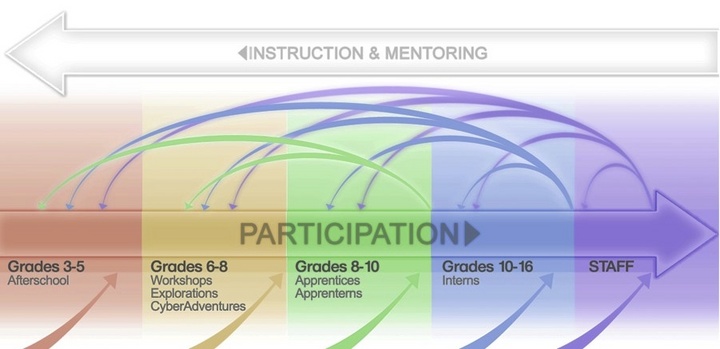Shodor wants to scale its work by implementing Computing MATTERS far beyond Shodor, serving as a model for dissemination of successful programs. Our goal is to enable students all over North Carolina, and eventually the nation, to share the same growth from excitement to experience to expertise through research opportunities and service as students in Shodor's hometown.
First and foremost, Shodor chooses to focus on pathways not pipelines to develop a workforce that will use cyberinfrastructure to accomplish the next generation of advances in science and technology. Students may wander on many paths, sometimes retracing their steps, or crossing from one path to another, using parts of the technology infrastructure along the way.

Schooling and training may be punctuated by internships, full-time work, or life experiences
away from the lab or workbench. There are multiple opportunities to come back to the community
of participants, and one shouldn't feel the need to stay the course all the way in a linear
fashion if other opportunities present themselves. But a person who catches the spark of
excitement that comes from that
"a ha" moment of discovery can always step back on the path at some later time.
Our formula starts with informal activities and explorations that generate real excitement by having students learn from scientists and engineers. Some will continue as apprentices to gain experience , joining others who want to proceed to develop real expertise as interns working side-by-side with experts. High school and college students themselves serve as near-peer mentors for others. No longer is education a mere linear progression through school, filtering out the low performers as one goes along, until only a select few dribble out the end of the pipeline with a degree in computer science, mathematics, engineering, or science.
More than 1200 students from the Research Triangle area of North Carolina have taken workshops after school or on Saturdays or during the summer stimulating their excitement by using state-of-the-art CyberInfrastructure (CI) tools to conduct real math and science investigations. When sufficient skills are mastered, students qualify for paid internships through the Mentor Center working even closer with staff scientists, educators, post-docs and undergraduates.
External evaluation of these projects has demonstrated their success in attracting a truly diverse group of students, a large percentage being young women and minority students who might otherwise have shied away from a technology-enhanced experience. By working in teams, focusing more on the content than the technology, our students master both.
Student workshops cover a variety of topics, designed to fit the needs of a specific student population. Here are a few examples of past workshops for middle and high school students:
-
Modeling Your World: Learn about the role of computers in modern science by creating computer models of
authentic scientific problems.
-
Forensics: Observe, gather, and analyze physical evidence to solve a mystery! Learn about special
mathematical and scientific methods that can uncover the truth, and apply them to a mock
crime scene.
-
Math Explorations: This class builds bridges between math concepts and the use of those concepts in problem
solving situations.
-
Engineers in Training: Introduces students to the basic elements of a computer-aided engineering design process
through exploration and development of small scale systems.
-
Graphics/Visualization: Explore how computer graphics and data visualizations, both scientific and artistic, are
created. In the process, learn about free graphics programs you can download and use at
home.
- Scholars Program: The program provides a two-week, academically-intensive education and research program to a competitively-selected group of students. Students use advanced computational science technologies, techniques, and tools to study a wide variety of scientific events.
More information on student programs, as implemented at Shodor, can be found at Shodor's Mentor Center or Project SUCCEED. Student Programs are rapidly spreading. Please see locations to find a program near you.